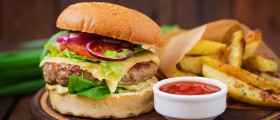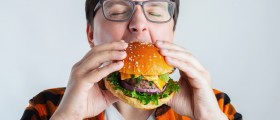
Food can cause addiction that manifests in physical cravings, obsession with food and other symptoms. Food addiction is associated with eating disorders. Although there are four types of eating disorders, only overeating and binge eating are considered as food addiction while anorexia and bulimia are defined as disorders.
Causes of Food AddictionFood addiction actually represents chemical dependence on food. Some believe there are certain foods such as chocolate and cheese that can cause overeating and addiction. Also, food addiction is associated with hyper production of dopamine, a neurotransmitter in the brain. Dopamine influences a person’s mood and controls the brain’s centers for pleasure and reward. Certain foods can trigger secretion of dopamine in the brain thus causing cravings for those foods. This eventually results in compulsive overeating in some people.
Some foods stimulate overproduction of dopamine in the brain and are therefore more addictive. These foods are typically rich in sugar and fats. The examples of such food are chocolate, cheese and processed food. Chemical compounds contained in these foods are triggering release of dopamine.
Food addicts often try to fix their emotional emptiness with foods that provide pleasure and comfort. Also, low self-esteem often causes people to become addicted to foods. According to some experts, one must restore his or her self-esteem and take control over their destructive behavior in order to overcome this addiction.
Characteristics of Food AddictionFood addiction is not the same as alcohol and drug addiction but food addicts exhibit symptoms similar to those of other addictions. Food addicts are preoccupied with foods and tend to overeat despite negative consequences. They do not have self-control when it comes to eating and many times they try to restrict food intake but they fail. This leads to feeling of guilt or remorse after eating.
Binge eating and compulsive overeating are eating disorders that cause affected individuals to be overweight. However, compulsive overeating and binge eating are not the same thing. Compulsive overeating involves picking at food all day in order to deal with unpleasant feelings. Compulsive eaters typically fail to restrict their food intake as they are driven by emotions. Binge eating involves eating of large amounts of food in a short period of time, usually secretly when no one is present.
In both binge eaters and compulsive overeaters their excess weight serves them as a protection against others and a shield for their low self-confidence.
Treatment for Food AddictionCommon treatment for food addiction includes food addiction program, binge eating program or compulsive overeating program, all designed to manage excess consumption of food. The program is a 12-step philosophy that aims to spiritually transform the sufferer. However, this program does little to improve one’s self-esteem and does not focus on helping people to lose unhealthy weight. The program also does not include exercise program and does not point out toward a healthy diet.

















Your thoughts on this
Loading...